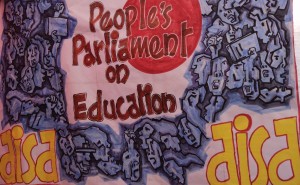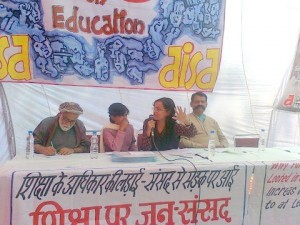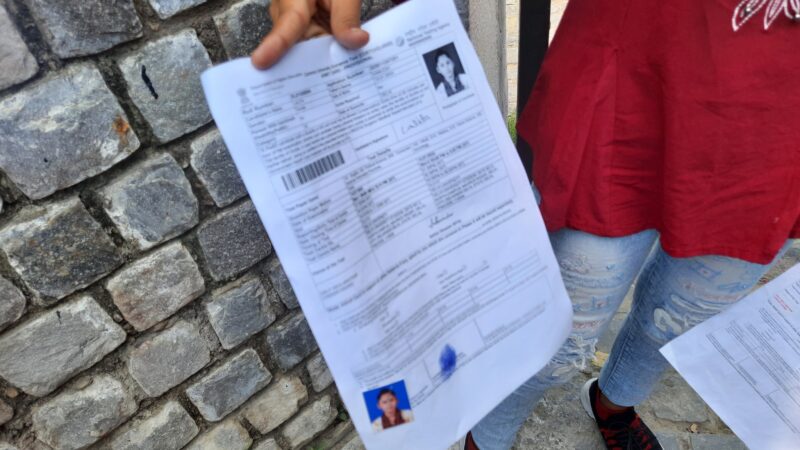AISA’s ‘People’s Parliament’ Rejects UPA’s Pro-Corporate, Pro-Privatization Bills on Education!

On the first day of the budget session of Parliament (Feb 21st), AISA held a “People’s Parliament on Education”, along with the All India Forum for Right to Education. Several noted educationists and teachers participated at this People’s Parliament, including Prof. Anil Sadgopal, Ramesh Patnaik, Dr. Soumen Chattopadhaya (JNU), Dr. Maninder Thakur (JNU), Prof. Minati Panda (JNU), Dr. V.N. Sharma, Dr. Ramesh Sarin (Satyawati College, DU) and Dr. Vikas Gupta (DU). The People’s Parliament was also addressed by Dipankar Bhattacharya, Gen, Secretary, CPI(ML).
This People’s Parliament was organized in the backdrop of the UPA’s attempts to further commercialise and privatise education: in the current budget session, the UPA proposes to table to a slew of anti-student and pro-corporate Bills. Several of the participants at the People’s Parliament discussed the repercussions of the proposed legislations, which will not just usher in a regime of corporate-driven education, but will also scuttle reservations and social inclusion in institutions of higher learning. After a detailed discussion of the proposed legislations, the People’s Parliament rejected them.

The proposed Bills represent a significant and dangerous paradigm shift in our education policy, since the pave the way for massive privatization and commercialization of higher education and also for a regime of unregulated lawlessness and profit-making. The slew of Bills include the Foreign Educational Institutions (Regulation of Entry and Operations) Bill 2010, The National Council for Higher Education Research (NCHER) Bill 2010, The Educational Tribunals Bill 2010; The National Accreditation Regulatory Authority for Higher Educational Institutions Bill, 2010; The Prohibition of Unfair Practices in Technical Educational Institutions, Medical Educational Institutions and Universities Bill, 2010 and the Innovative Universities Bill among others.
Special Education Zones?!!
- Enter a Regime of Corporate-Driven Education: These proposed legislations will mean unregulated, exorbitant fee hikes, commercialization of campus spaces and facilities like health care, halls, canteens and auditoriums, extraction of “user charges” even for basic facilities like water and electricity and a fundamental shift in focus of educational curriculum towards market-oriented courses. Basic sciences, social sciences and humanities courses will slowly be replaced by market-driven self-financed ‘applied’ courses which will have serious socio-political implications.
- Official Goodbye to Reservations and Social Inclusion: Reservations will NOT be mandatory in the higher education institutions being envisaged. As it is, university administrations are trying their level best to subvert the potential of the legally mandated SC/ST and OBC reservations. Through these proposed legislations however, the UPA is planning to bid an OFFICIAL goodbye to reservations and affirmative action in higher education.
- Heralding a Regime of Immunity for the Private Players from the Law of the Land: In the name of “regulating” educational institutions, the proposed legislations (particularly the Educational Tribunals Bill, the Prevention of Unfair Practices Bill and the National Council for Higher Educational Research Bill) essentially pave the way for a regime where increasingly privatized educational institutions would be granted immunity from the law of the land. Several clauses allow the government to “exempt” educational institutions from provisions of the Bills; students will no longer be able to approach district level courts or the High Courts against injustices in the institutions!
It is therefore clear that the issue at hand is NOT merely the corporate takeover of higher education but also one of granting virtual immunity to these corporate owners from the country’s existing legal provisions. The Bills brought in the name of “regulations” have evidently been designed to scuttle the possibility of students or teachers challenging university administrations or state policies (see Gems from the Bills). Take for instance the Educational Tribunals Bill. This Bill envisages the setting up of a parallel grievance redressal mechanism: various State Educational Tribunals and a National Educational Tribunal will be set up, which will operate independently of the existing judicial system. To begin with, the instances wherein students can approach these Tribunals have NOT been spelt out clearly. Clearly, these ambiguities are likely to be used by the Tribunals to refuse to hear several cases pertaining to complaints of the student community. And of course, the exemption clauses of the Bills will allow pro-corporate governments to bail out any institution they want, and prevent action against malpractices.
Moreover, if the Educational Tribunal Bill becomes operational, students will not be able to approach district courts or even the High Courts on any issue related to functioning of educational institutions. Students will therefore be left in a bizarre situation where they can go nowhere for justice! It is only after exhausting the long process of first approaching the State Educational Tribunal, and then the National Educational Tribunal that students can finally approach the Supreme Court for justice. It is common knowledge that it is virtually impossible for people living in most parts of the country to approach the Supreme Court – the geographical and financial constraints will be too much for them to circumvent. In other words, the profit-driven, corporate-managed educational institutions will be granted a free hand to break any number of rules and regulations.
In our country, neo-liberal policies have pushed in SEZs (Special Economic Zones) – deemed to be “foreign territories” – where laws of the land do not apply. Democratic structures like municipal corporations and Panchayati Raj institutions are dismantled; no environmental or labour laws apply – in other words, corporations are a law unto themselves. Now, the UPA is proposing to similarly convert yet another crucial sector (education). Another version of SEZs – Special Education Zones is now being created, where the law of the land on social justice, inclusion, democratic functioning will be given a declared goodbye!
The COMPOSITION of the so-called “regulatory” bodies proposed in the Bills is yet another indication of regime which the UPA wants to put in place.
- The State Educational Tribunal will consist of a Judge of a High Court, one Vice Chancellor of a University, and one Chief Secretary of the State Government. The National Educational Tribunal similarly consists of two judicial members, three Academic members and three Administrative members. Clearly, the composition in the Tribunals are skewed in favour of educational institutions and their supporters in pro-corporate governments. Moreover, there are clauses that allow for the tribunals to continue their work even in the absence of judicial members!
- The NCHER similarly includes of 10 members of industry associations (like the Associated Chamber of Commerce and Industry of India, CII, Federation of Indian Export Organizations and All India Manufacturers Association). It will also include representatives of union and all state governments, heads of 14 professional bodies like the MCI and the Bar Council of India, 13 research councils like CSIR and ICSSR, and heads of IITs, IIMs, and vice chancellors of all central universities by rotation.
The composition of the proposed regulatory bodies shows that future regulation of educational institutions (if these proposed Bills are passed) will largely be in the hands of corporations, the heads of the very educational institutions for whom the “regulations” are supposed to apply, and their supporters in the government! Don’t such provisions doom the very idea of a neutral, unbiased regulatory system?!
It is therefore clear that the proposed legislations are neither the need, nor the demand of the common people of the country. At a time when the government is planning to push through several anti-student policies, it is necessary to reject these corporate-driven Bills and put forward a comprehensive alternative agenda to realize a truly inclusive and democratic education system in India.
Gems from The Bills
“No court shall take cognizance of any offence under this Act which is alleged to have been committed by any institution or director, manager, secretary or other officer thereof, except on the complaint in writing of such person authorized by the Central Government or the State Government in that behalf or by such person authorized by the concerned appropriate statutory authority, as may be prescribed.”
– Clause 18 of the Prohibition of the Unfair Practices Bill
“Not withstanding anything contained in this Act, the Central Government may…..having regard to the reputation and international standing of foreign educational institution and such other criteria as may be prescribed, exempt such institutions from operation of any of the foregoing provisions..”
– Clause 9 of the Foreign Educational Institutions Bill
“If the Central Government is of the opinion that it is necessary or expedient in the interests of the general public so to do so, or for advancement of knowledge, it may ……exempt any class or classes of higher educational institutions from the operation of all or any of the provisions of the Act…”
– Clause 49 of the National Accreditation Regulatory Authority Bill
“No civil court shall have jurisdiction to entertain any suit or proceeding in respect of any matter which the State Educational Tribunal or the National Educational Tribunal is empowered by or under this Act to determine and no injunction shall be granted by any court or other authority in respect of any action taken or to be taken in pursuance of any power conferred by or under this Act.”
– Clause 47 of the Educational Tribunals Bill
People’s Charter on Education
Also, the People’s Parliament adopted an alternative People’s Charter on Education. The main points in the people’s charter included:
- Curbing of privatization and commercialization: the charter demanded that the offers made by the UPA to bring education under the WTO/GATS regime. Also, the Public Private Partnership (PPP) model should be completely done away with: all state funding should be invested in state-owned institutions, and not routed through PPP projects. Fee structures of existing educational institutions should be strictly monitored, and they should not be allowed to charge exorbitant fees arbitrarily. Active steps should be taken to prevent new private players from entering the education sector. Policy initiatives aimed at commercializing campus spaces and facilities should be reversed immediately.
- Regulation of higher education institutions: The government should put an end to the mushrooming of unrecognized colleges and universities, and should tackle the lack of proper infrastructure, lack of qualified faculty, poor conditions of work, scuttling of legally mandated reservations, and increasing contractualisation in the education sector.
- Budget allocation for education: The budget allocation of education should be increased to at least 10% of Union budget, and this money should not be routed through PPP projects. It should be used to create state-funded and residential educational institutions where all basic facilities are heavily funded.
- Social inclusion in educational institutions: In order to ensure more social inclusion, a progressive admission policy (which incorporates deprivation points for students from backward areas and also for women) should be universally put in place. Also, SC/SC/OBC/PH reservations should be made universally mandatory. Madarsa certificates should be recognized and existing financial assistance schemes should be enhanced. Educational institutions should encourage students from multi-lingual backgrounds and accessibility to physically challenged students should be increased.
- Inclusion of women in education institutions: Apart from financial assistance to women students, special cells to look into issues of sexual harassment should be instituted in all colleges and universities, and moral policing of women through dress codes and restrictions of the movement of women should not be allowed.
- Campus democracy: Greater democratic participation of students in decision-making processes should be ensured, and democratization of campuses should be encouraged through a culture of debate and discussion.

Thanks for this nice post, you have raises very good points. I will come again.
Respected Sir,
This is a plea for justice from over 400 students who are facing a very harsh decision of “Two Year Back ” under UMC (unfair means of cheating) case by Maharishi Dayanand University ,Rohtak Harayana. Our roll numbers for current semester will not be provided to us and we will not be allowed to sit in exams which will start from 15th May 2011. All the parents and students are very tensed because our future is on stake. Most of the student are resident of urban areas and cannot afford this decision. Please this is a heartiest plea from all the 400 students who will suffer from this decision to help us because you are our only hope. Please help us out otherwise the future of 400 students will be no more. We all are desparately waiting for your help sir,please save us all
Thank You
sir plz request hai agar ye thik nhi hua to mai sucide kar sakta hu mere dil aur dimaag mein yahi chalta rahta hai..sir. save me sir save me